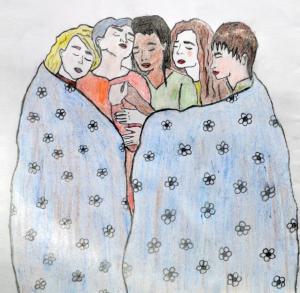You are here
- Home
- Women who #ChooseToChallenge social injustice
Women who #ChooseToChallenge social injustice
7 March 2021

The Open University is marking International Women’s Day with a social media campaign to ‘cut through the global chatter’ and focus attention on a very special group of women.
Every hour, on the hour, the university will promote a fresh piece of digital content on Twitter, Instagram and Facebook, co-created by women refugees, asylum seekers and migrants facing up to the challenges of COVID-19.
“The theme of this year’s International Women’s Day is #ChoosetoChallenge, and these twelve pieces are very powerful statements of how women are choosing to challenge the multitude of human rights violations and abuses they face in situations of forced migration,” says Professor Marie Gillespie, a leading researcher in the emerging field of digital anthropology.
“From campaigning tirelessly against the abuse of women in detention centres, to finding ways of coping with the effects of trauma, isolation and poverty, we pay tribute to the amazing tenacity and capacity for creativity of the women we work with in challenging the obstacles they face.”
Since March 2020 Professor Gillespie has been leading this novel ethnographic research project COVID-19 Chronicles from the Margins which finds expression in a co-created digital platform, a ‘living archive’, and an exhibition which is capturing the pandemic from the perspective of asylum seekers, refugees and migrants in the UK and world-wide.
These people, and the women in particular, have been among those hardest hit, as many of the services they depended on, such as language classes and, drop-in centres, have either ceased or are no longer available to them due to digital poverty.
The 12 pieces for International Women’s Day – videos, blogs and images made by women – reveal the dark side of their experiences but also the light.
We hear from a bride left alone and destitute after the husband she came to the UK to marry died from COVID, but we also see women in a Nigerian refugee camp swaying and clapping as they perform a ‘coronavirus song’ to teach primary school children how to keep safe.
“Throughout the pandemic, all of us have been sharing experiences that refugees and migrants have been familiar with for decades: fearful of going out, fearful of an invisible enemy, frightened by a precarious and uncertain future, suffering from social isolation and lack of control,” Professor Gillespie says.
“Women asylum-seekers have been disproportionately affected by the pandemic. We can all learn from their contributions about artful resistance to marginalisation.”
The project is creating a unique archive of an extraordinary period in time. It also illustrates how digital resources are transforming the way we conduct research and document human history, opening it up to previously unheard voices.
“When we started the project in March 2020 we thought it would last for the eight weeks of lockdown. We invited contributors to send us content using their smartphones,” said Professor Gillespie.
“We didn’t imagine then that the project would expand in this way, but it has provided a space of expression and solace for many. One year on, we are still receiving amazing material via smartphones.
“We are also training refugee researchers in digital storytelling, co-creating content with them, and working with support organisations, arts and community groups and challenging the UK government’s hostile environment for migrants policies. It has been a truly eye-opening experience.”
You can follow and engage with the content throughout Monday 8 March @Cov19chronicles, and also see more of our content on our website www.cov19chronicles.com – and contact us if you’d like to contribute.
Project funded by The Open University (UK) and supported by the International Institute of Social Studies (Netherlands) and the University of Wales Trinity Saint David (UK).
Picture by Afghani refugee and feminist activist Sweeta Durrani for International Women's Day.
Share this page:
Monthly Archive
- March 2024 (1)
- November 2023 (1)
- February 2023 (1)
- January 2023 (1)
- November 2022 (1)
- October 2022 (1)
Contact us
To find out more about our work, or to discuss a potential project, please contact:
International Development Research Office
Faculty of Arts and Social Sciences
The Open University
Walton Hall
Milton Keynes
MK7 6AA
United Kingdom
T: +44 (0)1908 858502
E: international-development-research@open.ac.uk
.jpg)